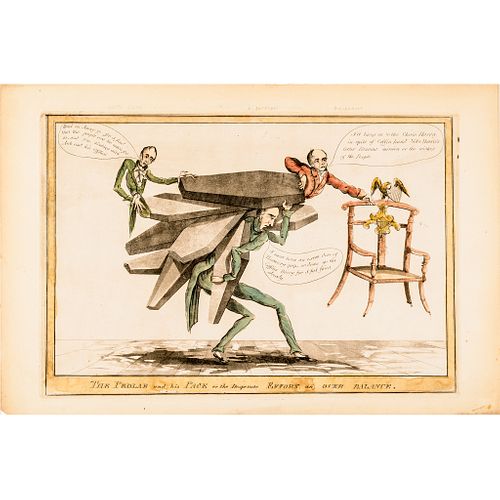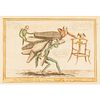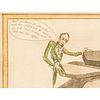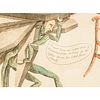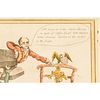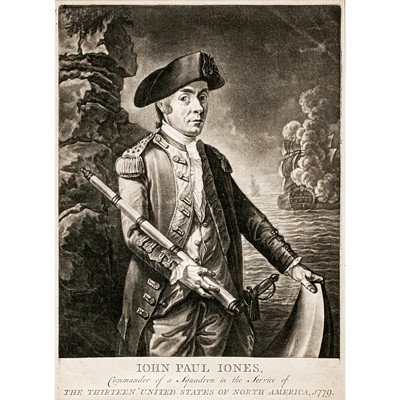1828 Presidential Campaign Political Cartoon Andrew Jackson Attack, Clay + Adams
Lot 248
Categories
Estimate:
$1,200 - $1,600
Absentee vs Live bid
Two ways to bid:
- Leave a max absentee bid and the platform will bid on your behalf up to your maximum bid during the live auction.
- Bid live during the auction and your bids will be submitted real-time to the auctioneer.
Bid Increments
| Price | Bid Increment |
|---|---|
| $0 | $10 |
| $200 | $20 |
| $300 | $25 |
| $500 | $50 |
| $1,000 | $100 |
| $2,000 | $200 |
| $3,000 | $250 |
| $5,000 | $500 |
| $10,000 | $1,000 |
| $20,000 | $2,000 |
| $30,000 | $2,500 |
| $50,000 | $5,000 |
| $100,000 | $10,000 |
| $200,000 | $20,000 |
| $300,000 | $25,000 |
| $500,000 | $50,000 |
About Auction
By Early American History Auctions
Jan 23, 2021
Set Reminder
2021-01-23 12:00:00
2021-01-23 12:00:00
America/New_York
Bidsquare
Bidsquare : Early American History Auction of Autographs, Americana, Political & Maps
https://www.bidsquare.com/auctions/early-american-history-auctions/early-american-history-auction-of-autographs-americana-political-maps-6311
311 Lots of Rare, Historic Autographs, Americana, Civil War Era, George Washington, Abraham Lincoln, Slavery & Black History, Revolutionary War Era, Colonial America, Federal Period, War of 1812, Colonial Currency, Indian Peace Medals & more... Early American History Auctions auctions@earlyamerican.com
311 Lots of Rare, Historic Autographs, Americana, Civil War Era, George Washington, Abraham Lincoln, Slavery & Black History, Revolutionary War Era, Colonial America, Federal Period, War of 1812, Colonial Currency, Indian Peace Medals & more... Early American History Auctions auctions@earlyamerican.com
- Lot Description
Political
1828 Presidential Campaign Hand-Colored Political Cartoon Attacking Andrew Jackson by Henry Clay & J. Q. Adams
1828 Presidential Campaign Broadside, Hand-Colored Political Cartoon Etching titled: "The Pedlar and his Pack or the Desperate Effort, an Over Balance." regarding the Reverse Impact of Philadelphia Editor John Binn's Anti-Jackson "Coffin Handbill" Campaign, Choice Very Fine.
This rare Hand-Colored Political Cartoon Broadside measures about 13.75" x 9.5", printed on period wove print paper laid down to backing card and nicely matted to 17" x 12.25" for display. It is titled: "The Pedlar and his Pack or the Desperate Effort, an Over Balance." Being a satire on the reverse impact of John Binns's anti-Jackson "Coffin Handbill" political campaign during the Presidential race of 1828. Philadelphia Editor-publisher John Binns supports on his back a large load of coffins, upon which are figures of Henry Clay (left) and incumbent President John Quincy Adams (right). A rare satirical piece referencing John Binns's notorious "Coffin Handbill" tactic during the 1828 Presidential election used them to attack Andrew Jackson on a highly personal level and not all the claims were true. The "Coffin Handbill" received its name because the early attack pamphlets used coffins to signify the people who had died because of Andrew Jackson in the War of 1812. In this cartoon Binns is seen struggling with a load of coffins. Resting on top of them are Henry Clay (left) and John Quincy Adams (right), who was the Presidential incumbent. Binns is shown saying, "I must have an extra dose of Treasury-pap, or down go the Coffins Harry, for I feel faint already." Henry Clay is seen crying, "Hold on Jonny Q--for I find that the people are too much for us, and I'm sinking with Jack and his Coffins!" Meanwhile, Adams desperately holds onto the Presidential seat saying, "I'll hang on to the Chair Harry, in spite of Coffin hand-bills Harris's letter Panama mission or the wishes of the People." The printed statements read as follows:
John Binns: "I must have an extra dose of Treasury-pap, or down go the Coffins Harry, for I feel faint already."
Hnery Clay: "Hold on Jonny Q--for I find that the people are too much for us, and I'm sinking with Jack and his Coffins!"
John Quincey Adams (grasping the Presidential chair): "I'll hang on to the Chair Harry, in spite of Coffin hand-bills Harris's letter Panama mission or the wishes of the People."
Binns, holding eight coffins on his back, was the Philadelphia publisher who had issued the notorious "coffin handbill," displaying six black coffins and calling Jackson's execution of six Tennessee militia men in 1815 an act of murder. The usual descriptions of this item depict Clay and Adams as stuck in between or on top of the coffins; instead, it appears as if each has pulled himself half out of his own coffin. Weitenkampf 21. Reilly, American Political Prints 1828-3. OCLC records seven locations under several accession numbers, as of January 2018.
In 1828, Andrew Jackson, who had lost the 1824 election in a runoff in the United States House of Representatives, despite winning both the popular vote and the Electoral vote by significant margins, ran for President of the United States. He had been nominated by the Tennessee state legislature in 1825, and did not face any opposition from Democratic candidates.
Jackson launched his campaign on January 8, 1828 with a major speech on the 13th anniversary of the Battle of New Orleans from 1815, thus marking the birth of the modern Democratic Party. Jackson accepted John C. Calhoun, incumbent Vice President under John Quincy Adams, as his running mate.
John Quincy Adams was an unpopular President from the beginning of his term, and the Democratic Party, which was just beginning to emerge as a political force, mobilized behind Jackson, a popular war hero who had served in the Battle of New Orleans.
Despite his successes as a member of both the House of Representatives and the Senate, as well as the Military Governor of Florida, Jackson had been born in relatively modest surroundings in rural Carolina, which appealed to the majority of Americans, who were small farmers who benefited from the introduction of Universal male suffrage from the 1820s to the 1840s. This expansion of voting rights helped both major political parties (the Democrats and the National Republicans) canvass voters and expand the popular vote.
The campaign was marked by large amounts of nasty "mudslinging." Jackson's marriage, for example, came in for vicious attack. When Jackson married his wife Rachel in 1791, the couple believed that she was divorced, however the divorce was not yet finalized, so he had to remarry her once the legal papers were complete. In the Adams campaign's hands, this became a scandal. Charles Hammond, in his Cincinnati Gazette, asked: "Ought a convicted adulteress and her paramour husband be placed in the highest offices of this free and Christian land?"
Jackson also came under heavy attack as a slave trader who bought and sold slaves and moved them about in defiance of modern standards or morality. (He was not attacked for merely owning slaves used in plantation work.) The Coffin Handbills attacked Jackson for his courts-martial, execution of deserters and massacres of Indian villages, and also his habit of dueling.
- Shipping Info
-
Early American provides in-house worldwide shipping. Please contact us directly if you have questions about your specific shipping requirements.
-
- Buyer's Premium



 EUR
EUR CAD
CAD AUD
AUD GBP
GBP MXN
MXN HKD
HKD CNY
CNY MYR
MYR SEK
SEK SGD
SGD CHF
CHF THB
THB